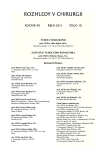-
Medical journals
- Career
Traumatic Atlantoaxial Rotatory Fixation in a Child
Authors: P. Kľoc; Ľ. Tomčovčík; S. Vyskočová *
Authors‘ workplace: Klinika úrazovej chirurgie, FNsP J. A. Reimana, Prešov, Slovenská republika, prednosta MUDr. Ľ. Tomčovčík, PhD. ; Rádiologické oddelenie, NsP Bardejov, Slovenská republika, primár: MUDr. A. Havrilla *
Published in: Rozhl. Chir., 2011, roč. 90, č. 10, s. 594-597.
Category: Monothematic special - Original
Overview
Traumatic atlantoaxial rotary fixation is defined as low-energy mechanism injury resulting in fixed subluxation of the atlantoxial complex expressing oneself as a slight head flexion, lateral tilt of the head to one side, head rotation to the other side and painful limitation of motion that makes it impossible to turn head to the contralateral side voluntary. As a result of the rarity of the injury it is often neglected, treated improperly, treated for the duration, or it has permanent consequences. We present a case report of a 10 year old patient treated in our department with acute traumatic atlantoaxial rotary fixation. The diagnosis was made on the basis of synthesis of anamnestic data, clinical picture and static CT examination. The patient was successfully treated conservatively. In the discussion we present a brief look at the etiopathogenesis, diagnosis and treatment of the injury. Its pathogenesis is still not fully understood. The most reliable diagnostic methods are dynamic X-ray and dynamic CT examinations. In our discussion, more is dedicated to clinical diagnostics, and static X-ray and CT examinations as a way likely to lead together with anamnestic data on the accident at the correct diagnosis even in the absence of acute dynamic CT or X-ray examinations. The treatment of acute traumatic atlantoaxial rotary fixation is usually indicated for conservative treatment, with excellent results. Neglected cases generally require surgical intervention. Treatment of neglected atlantoaxial rotary fixation is usually difficult and permanently distorting anatomical growing organism.
Key words:
traumatic atlantoaxial rotary fixation – children – computer tomography
Sources
1. Kowalski, H. M., Cohen, W. A., Cooper, P., Wisoff, J. H. Pitfalls in the CT diagnosis of atlantoaxial rotary subluxation. AJR, 1987; 149 : 595–600.
2. Fielding, J. W., Hawkins, R. J. Atlanto-axial rotatory fixation: fixed rotatory subluxation of the atlanto-axial joint. J. Bone Joint Surg., 1977; 59 : 37–44.
3. Karkos, P. D., Benton, J., Leong, S. C., Mushi, E., Sivaji, N., Assimakopoulos, D. A. Grisel‘s syndrome in otolaryngology: A systematic review. Int. J. Pediatr. Otorhinolaryngol., 2007; 71 : 1823–1827.
4. van Hosbeeck, E. M. A., Mackay, N. N. S. Diagnosis of acute atlanto-axial rotatory fixation. J. Bone Joint Surg., 1989; 71 : 90–91.
5. Subach, B. R., McLaughlin, M. R., Albright, A. L., Pollack, I. F. Current management of pediatric atlantoaxial rotatory subluxation. Spine, 1998; 23 : 2174–2179.
6. Osenbach, R. K., Menezes, A. H. Pediatric spinal cord and vertebral column injury: experimental and clinical study. Neurosurgery, 2002; 30 : 385–390.
7. Abrar, A. W., Tanveer, A. D. M. B., Altaf, U. R., Altaf, R. K., Abdul, R. B. Craniovertebral junction injuries in children. A Review. Indian Journal of Neurotrauma, 2007; 4 : 79–87.
8. Wortzman, G., Dewar, F. P. Rotary fixation of the atlantoaxial joint: rotational atlantoaxial subluxation. Radiology, 1968; 90 : 479–487.
9. Sudek, P. Ueber drehnungsverrenkung des atlas. Dtsch. Z. Chir., 1923; 183 : 289–303.
10. Fielding, J. W. Cineradiography of the normal cervical spine. J. Bone Joint Surg., 1957; 39 : 1280–1288.
11. Villas, C., Arriagada, C., Zubieta, J. L. Preliminary CT study of C1 – C2 rotational mobility in normal subjects. European Spine Journal, 1999; 8 : 223–228.
12. Pang, D., Li, V. Atlantoaxial rotatory fixation: Part 3 of a prospective study of the clinical manifestation, diagnosis, management, and outcome of children with atlantoaxial rotatory fixation. Neurosurg., 2005; 5 : 954–971.
13. Phillips, W. A., Hensinger, R. The management of rotatory atlanto-axial subluxation in children. J. Bone Joint Surg., 1989; 71 : 664–668.
Labels
Surgery Orthopaedics Trauma surgery
Article was published inPerspectives in Surgery

2011 Issue 10-
All articles in this issue
- Secondary Peritonitis Prognosis Assessment
- Large Intestine Bleeding Caused by the Lienal Artery Pseudoaneurysm Rupture Complicating a Pancreatic Pseudocyst
- Traumatic Atlantoaxial Rotatory Fixation in a Child
- Late Surgical Conversion after Endovascular Treatment of the Abdominal Aortic Aneurysm
- Rupture of the Common Illiac Artery Isolated Aneurysm in a High Risk Patient – A Case Review
- Gall Bladder Adenomyomatosis
- Clinical Outcomes of Surgical Management of Acromioclavicular Dislocation with and without Ligament Suturing
- Leiomyosarcoma of the Inferior Vena Cava (Case Report)
- Acute Appendicitis – Overview of Current Knowledge
- A Rare Case of a Long-Term Patent Axillobipopliteal Bypass – A Case Report
- Comparison of Micturition, Sexual and Defecation Disorders in Females Following type B and C Pelvic Fractures
- Surgical Management of Jejunal Diverticulosis Complications
- Relapsing Urinary Tract Infections as a Single Symptom of a Foreign Body within the GIT in a Diverticulosis Patient
- Perspectives in Surgery
- Journal archive
- Current issue
- Online only
- About the journal
Most read in this issue- Gall Bladder Adenomyomatosis
- Acute Appendicitis – Overview of Current Knowledge
- Clinical Outcomes of Surgical Management of Acromioclavicular Dislocation with and without Ligament Suturing
- Surgical Management of Jejunal Diverticulosis Complications
Login#ADS_BOTTOM_SCRIPTS#Forgotten passwordEnter the email address that you registered with. We will send you instructions on how to set a new password.
- Career

